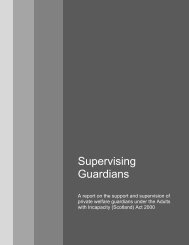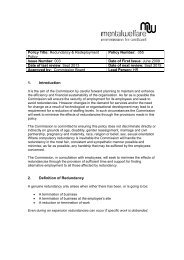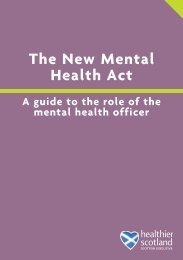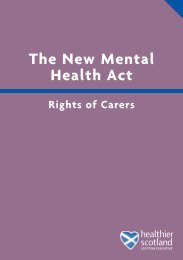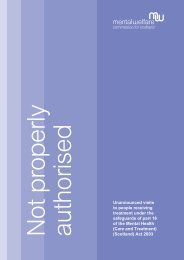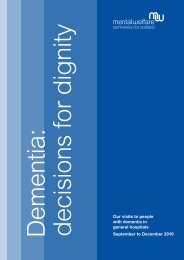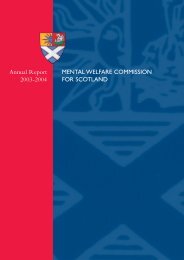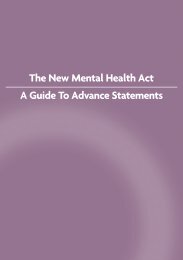Annual report 2012-13 - Mental Welfare Commission for Scotland
Annual report 2012-13 - Mental Welfare Commission for Scotland
Annual report 2012-13 - Mental Welfare Commission for Scotland
- No tags were found...
You also want an ePaper? Increase the reach of your titles
YUMPU automatically turns print PDFs into web optimized ePapers that Google loves.
dignity &respect caethical treaand lawfulequality<strong>Annual</strong> <strong>report</strong><strong>2012</strong>-<strong>13</strong>
“We aim to ensure that care, treatmentand support are lawful and respectthe rights and promote the welfare ofindividuals with mental illness, learningdisability and related conditions.”_Laid be<strong>for</strong>e the Scottish Parliament by the Scottish Ministers under Section 18 (2) of the<strong>Mental</strong> Health (Care and Treatment) (<strong>Scotland</strong>) Act 2003.October 20<strong>13</strong>SG/20<strong>13</strong>/211
ContentsWho we are and what we do 02Chair’s statement 04Key messages 06Effective and efficient visitingOur focussed visits 10Themed visits – adult acute visit 11Learning disability – community care visits 12Case study – Jeremy’s story <strong>13</strong>Monitoring and safeguardingcare and treatmentOverview of the use of mental health legislationin <strong>Scotland</strong> 15Overview of the use of incapacity legislationin <strong>Scotland</strong> 18Monitoring focus – when parents are detained 20Monitoring focus – immediate redetention 22Monitoring focus – consent to treatment 23InvestigationsWhy we investigate 25Anonymised investigations 25Our published investigations 26Ms AB 26Ms CD 27Our unpublished investigations 28Carol’s story 28Ian’s story 29Providing in<strong>for</strong>mation and adviceOur advice line 31Our website 32Email newsletter 32Case study – whole service improvement 33Good practice guidance 34Case study – Richard’s story 35Drug-induced psychosis guidance 36Advance statement guidance 37Influencing and challengingExcellence in Practice seminars 39Principles into Practice Awards 40National preventative mechanism 41External stakeholder events 42Improving our practiceInvolving people: advisory committee 46Learning lessons 46Our commitment to equality 47Financial resources 47Protecting the environment 4701
Who we are andwhat we doprinciplesleadershidignity &human r02communi
pOur aimWe aim to ensure that care, treatment and support are lawfuland respect the rights and promote the welfare of individualswith mental illness, learning disability and related conditions.We do this by empowering individuals and their carers andinfluencing and challenging service providers and policymakers.Why we do thisIndividuals may be vulnerable because they are less able at timesto safeguard their own interests. They can have restrictionsplaced on them in order to receive care and treatment. Whenthis happens, we make sure it is legal and ethical.Who we areWe are an independent organisation set up by Parliament witha range of duties under mental health and incapacity law. Wedraw on our experience as health and social care staff, serviceusers and carers.Our valuesWe believe individuals with mental illness, learningdisability and related conditions should be treatedwith the same respect <strong>for</strong> their equality andhuman rights as all other citizens. They have theright to:ightsc• be treated with dignity and respect• ethical and lawful treatment and to live freefrom abuse, neglect or discrimination• care and treatment that best suit their needs• recovery from mental illness• lead as fulfilling a life as possible.What we doMuch of our work is at the complex interfacebetween the individual’s rights, the law and ethicsand the care the person is receiving. We workacross the continuum of health and social care.• We find out whether individual care andtreatment is in line with the law and goodpractice• We challenge service providers to deliver bestpractice in mental health and learning disabilitycare• We follow up on individual cases where we haveconcerns and may investigate further• We provide in<strong>for</strong>mation, advice and guidance toindividuals, carers and service providers• We have a strong and influential voice in servicepolicy and development• We promote best practice in applying mentalhealth and incapacity law to individuals’ care andtreatment03
Effective andefficient visitingprinciplesleadershidignity &human r08communi
Our focussed visitsWe visit individuals in hospitals, care homes, prisons and other places where they receive care andtreatment. We want to hear what they think of their care, and find out if their needs are being met andtheir rights respected. If not, we make recommendations to staff and managers, and we check if theyhave done what we asked.This year, we undertook <strong>13</strong>3 focussed visits. We reviewed the care and treatment of 948 individuals,675 of whom we were able to interview in person. We made 491 recommendations. We committed tofollow up 90% of the recommendations we made. We followed up 97% of our recommendations.We can <strong>report</strong> that 93% of our recommendations have been fully implemented or resulted insignificant service improvement. We believe this demonstrates our effectiveness in influencing serviceimprovements through a targeted, risk-based programme of focussed visits.Of all the visits we carried out, 33% of recommendations we made related to NHS mental healthservices <strong>for</strong> older people, however we did carry out significantly more visits to this type of service.In the full <strong>report</strong> we give a detailed description of where we visited and the main themes that arose fromall our recommendations.Many of the recommendations we made related to the provision of therapeutic activity and the majorityof these related to services <strong>for</strong> older people both in NHS and private care home settings. We found thattoo often, activities were provided in a one-size-fits-all way and the personal preferences and abilities ofindividuals taking part in them were not always recognised.Other themes that emerged were:• Lack of compliance with the provisions of the Adults with Incapacity (<strong>Scotland</strong>) Act 2000• Lack of compliance with the <strong>Mental</strong> Health (Care and Treatment) (<strong>Scotland</strong>) Act 2003• The physical care environment• Inefficient care planning and review• Restrictions on individuals’ freedom of movement• Lack of person-centred care• Involvement of carers• Assessment of capacity• Training needs <strong>for</strong> staffRead the full focussed visit <strong>report</strong> on our website.“93% of our recommendations havebeen fully implemented or resulted insignificant service improvement.”_10
Themed visitsAdult acute visitThis year we visited all adult acute wards and intensive psychiatric care units in <strong>Scotland</strong>.As well as meeting with anyone who wanted to talk to us, we were particularly interested to meet withpeople who:• had been admitted three or more times in the last two years• were from an ethnic minority• had problems with drug or alcohol use as well as mental illness• were detained under the 2003 Act and had parental responsibilities <strong>for</strong> a child/children under 18 yearsof age• were homeless or in unsettled accommodation prior to admission• were deaf or deafened.On our visits we found some excellent examples of recovery-based care. We heard about how muchpeople felt they benefit from having lots of activities, having positive staff and having support from theirpeers.However, some people told us that they were not given enough in<strong>for</strong>mation or that they were notinvolved in planning their care. We also raised serious concerns about the poor physical environments insome of the wards.The majority of parents we spoke to said they were concerned about their children while they were inhospital. We feel staff should do more <strong>for</strong> parents to identify and address these concerns when they areadmitted.The full <strong>report</strong> is available on our website.11
“Due to the complexity of people’sneeds there must be close attention totheir rights and the legal basis of anyrestrictions.”_Learning disability – community care visitsWe wanted to look at the quality of life, the opportunities and the choices being experienced by peoplewho have been traditionally labelled as having high or complex support needs. We contacted localauthorities across <strong>Scotland</strong> <strong>for</strong> details of the most expensive care packages they provide to people withcomplex needs in the community.We visited 202 individuals across the 32 Scottish local authorities. We looked at various aspects of thearrangements in place to provide care and support.We were impressed overall with the support being provided to most of the people we saw. Particularly<strong>for</strong> those who had previously been in institutional care, the move to their own home had been literallylife-changing. We saw people with very complex needs receiving support. We felt there was invaluableinput from many of the providers, specialist health teams and local authority care managers.However, in some cases we felt that local authorities should be more regularly reviewing the individual’scare plan and how this is being delivered by the provider and their involvement of the service user. Dueto the complexity of people’s needs there must be close attention to their rights and the legal basis ofany restrictions.Our full <strong>report</strong> will be available later in the year on our website.12
Case study – Jeremy’s storyWe visited Jeremy during our visits to people with intensive support in the community.Jeremy had severe physical and learning disabilities. He had been receiving a large package of care fromthe council.Jeremy had been bought a Jacuzzi bath <strong>for</strong> therapeutic reasons. He was not getting to use this verymuch because staff were not being scheduled <strong>for</strong> long enough to help him to use it.We were concerned to see that Jeremy was spending most of his day in his wheelchair. A special chairhad been bought <strong>for</strong> him out of his own money but this was not suitable <strong>for</strong> him.Jeremy was being put to bed very early in the evening so that he could change positions after being inhis wheelchair all day. We did not think this was fair to him.There was no evidence that the care provider was reviewing Jeremy’s care needs.We contacted the social work department to in<strong>for</strong>m them about our concerns and ask them to makesome changes to how they managed Jeremy’s care package.Following our intervention we heard from Jeremy’s care team who said he was now getting extra time tohave baths, a new chair was being organised and that reviews were carried out as they should be.The care team were grateful <strong>for</strong> the changes that had been made following our intervention and saidthat, whilst small, they had a big impact on Jeremy’s life.<strong>13</strong>
Monitoring and safeguardingcare and treatmentprinciplesleadershidignity &human r14communi
Overview of KPIsp- We processed 28,797 <strong>Mental</strong> Health Act and 2,096 Adultswith Incapacity Act <strong>for</strong>ms- We monitored the support parents received when they aredetained- We monitored cases where patients were detained onback-to-back short-term detention certificates- We monitored the use of section 47 certificates under theAdults with Incapacity Act in homes, acute hospitals andmental health wards <strong>for</strong> the care of the elderlyBoth our annual monitoring <strong>report</strong>s are available in full from our website.Overview of the use of mental health legislation in <strong>Scotland</strong>We receive notifications of most interventions under the 2003 Act. We use these to <strong>report</strong> on how theAct is used. We also continue to <strong>report</strong> geographical variations in the use of the Act.ightsThis year, we have three major concerns: emergency detention, social circumstance <strong>report</strong>s andadmission of children to adult wards.Emergency detentionThis year, we found a 3% rise in all new episodes of compulsory treatment.cWe were concerned that the number of emergency detention certificates (EDCs) rose by 7%. Wewould expect short-term detention to be used instead. Short-term detention involves an assessmentby an experienced psychiatrist and social worker be<strong>for</strong>e the individual is deprived of liberty and giventreatment without consent. NHS Highland and NHS Dumfries and Galloway had the highest rates ofemergency detention.15
We found a high number of older people admitted from the community via an EDC. We are looking intothe reasons <strong>for</strong> this.If emergency detention is used, a mental health officer (MHO) must consent unless this is impracticable.This year, we found that the proportion of EDCs with MHO consent was much higher in Ayrshire than inprevious years.Most EDCs are granted outside “office hours”. The Ayrshire councils withdrew from the West of <strong>Scotland</strong>standby service and set up their own out-of-hours MHO service. In contrast, we found that most EDCsgranted in Greater Glasgow and Clyde did not have MHO consent. This NHS Board and its local authoritypartners must examine out-of-hours MHO services as a matter of urgency.Social circumstances <strong>report</strong>sWe remain concerned that MHOs are not providing social circumstances <strong>report</strong>s (SCRs). We find these<strong>report</strong>s extremely valuable when we are asked to look into an individual’s care and treatment.There are many events that should trigger an SCR, too many, in our view. However, it is unacceptable<strong>for</strong> there to be no SCR at all <strong>for</strong> individuals detained under short-term certificates or criminal procedureorders. We are concerned that the lack of provision of SCRs shows that MHO services are struggling tocope with the duties imposed by mental health, incapacity and adult protection legislation.Admission of children to adult wardsThe Scottish Government’s previous mental health strategy included a commitment to reduceadmissions of children to adult wards.Many NHS Boards have failed to achieve this.This year, the number of admissions <strong>report</strong>ed to us rose to 177. Nearly three-quarters were in four NHSBoards: Greater Glasgow and Clyde, Forth Valley, Grampian and, in particular, Lanarkshire, where therewas a large increase. In contrast, Lothian and Fife had very few admissions to adult wards.The largest increase in admission was <strong>for</strong> girls. Many of these were in response to actual or threatenedself-harm. This is a challenge to the implementation of the Scottish Government’s latest mental healthstrategy. We found that admission to adult wards is least likely in areas where intensive home treatmentis available.We also found a rise in the treatment of girls under compulsory powers, especially short-term detentionand safeguarded treatment with artificial nutrition. We had raised concerns that parents had been askedto give consent where girls under 16 were treated <strong>for</strong> eating disorders. The Act gives greater safeguardsand we think it is probably good that it is being used more.16
Other findingsSome other interesting points we found were that:• Short-term detention was highest in inner city areas• Detention by nurses has risen, but we still think this is not <strong>report</strong>ed as often as it should be• The total number of compulsory treatment orders (CTOs) in existence fell slightly. Looking back towhen the Act came into <strong>for</strong>ce, CTOs have risen by only 7% but over 40% are now community orders.This is a huge shift to community compulsory treatment without a major rise in the total use oflong-term orders.• Greater Glasgow and Clyde has the highest numbers of people on long-term orders of all types.Highland has a very high use of community orders. Dumfries and Galloway still has comparatively fewpeople on long-term ordersCriminal Procedure (<strong>Scotland</strong>) Act 1995 (CPSA) OrdersIt is difficult to interpret trends in CPSA orders on a yearly basis. This is due to variations in length ofcourt cases and not necessarily rises and falls in offending. The figures we quote are <strong>for</strong> order incidence,i.e. the number of orders granted in the period.This year, 236 individuals were subject to CPSA orders, the total number of orders amounting to 474.This compares to 212 individuals the previous year, with a total number of orders at 371.Last year we noted an increase in the use of Treatment Orders which has continued this year. TreatmentOrders are imposed either at a post conviction, pre-sentence stage or pre-trial, where an individual hasbeen charged but the proceedings are not yet underway or no decision about whether to proceed hasbeen taken.We will continue to monitor aspects of CPSA legislation as they apply to people with mental disorder.17
“...the percentage of orders granted onan indefinite basis has fallen by morethan half over the past four years.”_Overview of the use of incapacity legislation in <strong>Scotland</strong>Our monitoring of the use of the welfare provisions of the Adults with Incapacity (<strong>Scotland</strong>) Act 2000 isa result of our functions under the Act.We receive all statutory <strong>for</strong>ms relating to use of welfare provisions, visit some people on guardianship,provide advice and good practice guidance on the operation of the Act and also investigatecircumstances where an adult with incapacity may be at risk.We are part of the framework of legal safeguards that are in place to protect the rights of people onwelfare guardianship, intervention orders, and powers of attorney. We also monitor the use of Part 5 ofthe Act relating to consent to medical treatment and research.Here you can review our findings from these monitoring activities. The main messages are:• We looked into the use of welfare guardianship under incapacity legislation. The number of neworders continues to rise. The most striking development in this past year has been the increase inapproved local authority applications – up 12% in the past year following a 5% rise the previous year.This followed years where there was no increase in the number of local authority applications. Thisrepresents a significant challenge <strong>for</strong> local authorities in managing the workload of mental healthofficer services.• Dundee, Glasgow and East Lothian all had a very high increase in the rates of approved orders in2011/12 and these rates (per hundred thousand) increased even further in these areas in the past year.While the Scottish average <strong>for</strong> approved welfare guardianship applications stood at 44 per 100,000,these areas showed rates of 79, 77 and 76 respectively.• There was a further significant reduction in the granting of orders on an indefinite basis – down from45% in 2011/12 to 35% in the past year. This means that the percentage of orders granted on anindefinite basis has fallen by more than half over the past four years.• The granting of orders on an indefinite basis has fallen <strong>for</strong> both private (from 50% to 39%) as well aslocal authority (from 31% to 25%) approved applications.18
• The percentage of orders granted where the cause of the adult’s incapacity was dementia fell to 46%,down from 51% the previous year. Conversely, there was an increase from 37% to 41% of orders wherethe incapacity was caused by a learning disability. The rise in the number of approved orders in thepast year was solely down to the increased use <strong>for</strong> adults with a learning disability. This is the first yearwe have seen this.• Courts dealt with 82% of applications within two months.• In 18% of those 560 adults we visited, <strong>Commission</strong> staff had to undertake further casework becauseof issues picked up in carrying out the visits. These issues were primarily related to the welfareguardian not specifically delegating their powers to carers, the lack of evidence that the local authorityhad carried out their statutory duty to visit the adult, the lack of authority to administer medicationand no evidence that the continued need <strong>for</strong> the placement was reviewed by social work. Generally,however, we were satisfied with the care and treatment being provided.“In 18% of those 560 adults we visited,<strong>Commission</strong> staff had to undertakefurther casework because of issuespicked up in carrying out the visits.”_19
Monitoring focus – when parents are detainedWe looked at the support that parents receive when they are detained. Under section 278 of the <strong>Mental</strong>Health Act, there is a duty <strong>for</strong> service providers to mitigate the effects of compulsory measures onparental relations.When we did our visits to adult acute wards we spoke to patients about the support they received asa parent and this helped us with this <strong>report</strong>.We found that, although there are areas of good practice, these duties are generally unknown andneglected. Staff were often unaware of their obligations and struggled to meet them because ofinconsistent systems and a lack of resources.We spoke to nursing staff and mental health officers as well as looking at <strong>Mental</strong> Health Actdocumentation. We identified common themes, including challenges with inter-agency working andpoor awareness of s278. We also found a lack of resources to support families: from simple thingslike age-appropriate in<strong>for</strong>mation on mental illness, to child-friendly spaces in hospitals and access tocommunity support.This initial exploration allowed us to make recommendations, but it leaves many questions unanswered.The most important is how parents and children who have been through the experience of compulsoryprocedures feel. We hope to explore this in future. In the meantime, we will be mindful of the needs ofparents when we visit patients in psychiatric facilities throughout <strong>Scotland</strong>.We spoke to Alison, who was diagnosed with post-natal depression after having her first child ten yearsago. She has spent time in and out of hospital, but it was only two years ago she began receiving specificsupport as a parent.“Under section 278 of the <strong>Mental</strong> HealthAct, there is a duty <strong>for</strong> service providersto mitigate the effects of compulsorymeasures on parental relations.”_20
Alison says:“We have a family therapist; she’s made a real difference. She sees me as a mother, not just a patient.In the past, the only question I was asked about my children was if I was a danger to them.”Alison’s children now live with their father, but the family therapist has helped her to maintain contact.“When I couldn’t see my children, I felt obsessed with that. I don’t see how I was expected to get better inthose circumstances. Now I have access to my children, it’s made a difference to our relationship, and it’shelped me recover. I feel much better.”You can download When parents are detained from our website.“She sees me as a mother, not just apatient.”_21
Monitoring focus – immediate redetentionWe were asked by the Equality and Human Rights <strong>Commission</strong> to look into cases where individuals hadbeen detained in hospital after a failed application to the Tribunal. We also looked at other circumstanceswhere an individual had been further detained after the expiry of a short-term detention certificate(STDC).The 2003 Act <strong>for</strong>bids immediate re-detention after an STDC expires. “Immediate” is not defined in theAct, but it is important that the Tribunal looks into the grounds <strong>for</strong> detention as soon as possible. TheAct intended that this should happen within 28 days (with a possible extension of five working days toarrange a hearing).We found that in some cases individuals were detained under a further short-term detention certificate,but only because the application failed <strong>for</strong> technical reasons, not because the Tribunal rejected it on thebasis of the grounds <strong>for</strong> compulsion.If the risk to the patient is felt to be serious, doctors may need to re-detain the individual so that anotherapplication can be made to the Tribunal. Sometimes, we found it took too long to do this. We cameacross a case where the individual was, in effect, detained <strong>for</strong> 66 days be<strong>for</strong>e the Tribunal tested thegrounds. We think this is unacceptable and recommended strongly that the application should be mademuch sooner. We have asked the Scottish Government to look at changing the law to make sure thishappens.Our <strong>report</strong> ‘Immediate redetention’ is available on our website.“If the risk to the patient is felt to beserious, doctors may need tore-detain the individual so that anotherapplication can be made to theTribunal.”_22
Monitoring focus – consent to treatmentFrom July 2011 to November <strong>2012</strong> we conducted a series of unannounced visits to hospitals and carehomes to look at compliance with Part 5 of the Adults with Incapacity Act. We identified wards (inpsychiatric and general hospitals) and care homes where we were likely to find people who were notable to consent to their treatment.We spoke with staff to ask them to identify how many people they thought lacked capacity to consentand then looked at how many of those residents had Section 47 certificates in place.Treatment was being given under the authority of a Section 47 certificate to 79% of people who lackedcapacity to consent to treatment. We found better compliance with the legislation <strong>for</strong> individuals inhospital compared with residents in care homes.Where we found there were discrepancies, we immediately made recommendations to care managersto ensure that these were corrected.Our <strong>report</strong> Adults with Incapacity part 5 is available on our website.“We found better compliance with thelegislation <strong>for</strong> individuals in hospitalcompared with residents in carehomes.”_23
Investigationsprinciplesleadershidignity &human r24communi
p- We completed four major investigations- We remitted four cases back to local services after initialinvestigation. In these cases, we expressed concerns and maderecommendations to service managers <strong>for</strong> further internalinvestigation- We are continuing to investigate a further seven casesWhy we investigateWe investigate when we believe that something has gone wrong in the care and treatment of anindividual. Of course, we cannot investigate every case of poor treatment, so we aim to choose caseswhere we think there may be wider lessons.Through our visits and monitoring, we develop a general picture of care and treatment across <strong>Scotland</strong>.Our investigations allow us to drill down into a single case and make recommendations that can improvepractice across <strong>Scotland</strong>.ightsOur investigations focus on one person, but the recommendations will have an impact <strong>for</strong> lots of people.Anonymised investigationsAll of our investigation <strong>report</strong>s are anonymised. We don’t name people and we don’t name the area, thehealth board or the local authority. All of our investigation <strong>report</strong>s aren’t about naming and shaming;they’re about making things better across <strong>Scotland</strong>.By keeping our investigations anonymous, we can protect the individuals who our <strong>report</strong>s focus on. Itcalso makes the professionals we talk to more likely to speak openly.It also makes our <strong>report</strong>s relevant to everyone. Our recommendations aren’t just <strong>for</strong> the health boardarea where that investigation took place. We want professionals across <strong>Scotland</strong> to read them and thinkabout the lessons that they can learn.25
Our published investigationsMs ABMs AB has dementia and lives in a rural setting.She was supported at home until she was admitted to hospital in October 2011 following a couple of falls.Ms AB was unwilling to remain in hospital following her first fall, or to go to hospital the next day.A doctor arrived and gave Ms AB a sedative; she was then admitted to hospital in<strong>for</strong>mally.Ms AB did not want to be in hospital and was sedated several times to ease her agitation and aggressionand to stop her from asking to leave. This sedation was not always recorded on her prescription sheet.She was transferred to another hospital and, eventually, a nursing home. The doctors involved felt thatincapacity legislation allowed them to treat and move Ms AB.We think that Ms AB was unlawfully detained during her time in hospital. We were concerned by howoften she was given sedatives and the poor recording of this in her notes.It is important that hospitals which serve remote communities have proper policies and procedures tomeet the extra challenges of treating people in rural areas. We made recommendations to the ScottishGovernment, the NHS Board and its local authority partners.“It is important that hospitals whichserve remote communities have properpolicies and procedures to meet theextra challenges of treating people inrural areas.”_The full investigation is available from our website26
Mrs CDMrs CD had problems with anxiety and depression <strong>for</strong> many years. She became even more unhappy andwas constantly thinking of suicide and attempting to harm herself.Mrs CD had a lot of contact with emergency services, including the police, when she threatened orattempted to harm herself in public.She spent long periods in hospital and in the community under compulsory care. She was treated withmedication, electroconvulsive therapy and psychological treatment but it did not work.Mrs CD could be violent towards staff and, at times, other patients. Her psychiatrist decided that theproblem was Mrs CD’s personality, so a decision was made to discharge her and not to readmit her whenshe became distressed and difficult to care <strong>for</strong>.She ended up in prison <strong>for</strong> a short time be<strong>for</strong>e being transferred back to mental health care.We thought that it was unlikely any specific treatment would have helped, but that it was wrong that MrsCD ended up in prison when what she needed was care.We want service providers and policy makers to think about this case. It is an example of what can gowrong when an individual with serious mental distress becomes “too difficult” to provide with care andtreatment.“We thought that it was unlikely anyspecific treatment would have helped,but that it was wrong that Mrs CD endedup in prison when what she needed wascare.”_This investigation will soon be available from our website27
Our unpublished investigationsWe also investigated two other cases in depth during <strong>2012</strong>-<strong>13</strong>. In both cases, we decided that there hadbeen no deficiency of care and treatment. There were some learning points from both cases. We did notpublish the investigations, but we used the learning points in other ways.Carol’s storyWe heard about Carol from Healthcare Improvement <strong>Scotland</strong>. She was receiving electro-convulsivetherapy (ECT) as an outpatient. Sadly, Carol took her own life.The NHS Board reviewed her care and treatment. They sent the review to Healthcare Improvement<strong>Scotland</strong>, who thought that it was incomplete and suggested that we should investigate further.We reviewed Carol’s care and treatment and met the consultant psychiatrist responsible <strong>for</strong> her care. Wewere concerned that, during her treatment with ECT as an outpatient, the consultant undertook mostof the reviews by telephone. This was unusual but, when we reviewed her care, we understood andaccepted the reasons. Her decision to take her own life was sudden and unpredictable and related tofamily circumstances.We thought her care was good during this time but the consultant did not record the reasons <strong>for</strong> hisdecisions well enough. We highlighted this in our Chief Executive’s advice notes. We also thought thatthe internal review should have picked this up. The NHS Board is revising the way it carries out internalreviews.“...when we reviewed her care, weunderstood and accepted the reasons.”_28
“We used Ian’s case as part of theconsultation that produced our guidanceon the use of mental health legislation<strong>for</strong> ‘drug-induced psychosis’.”_Ian’s storyOfficials in the Scottish Government asked us to look into Ian’s care and treatment. He killed a closefamily member while suffering psychotic symptoms brought on by using street drugs shortly afterdischarge from hospital.Ian was known to mental health services. He had been prescribed medication but he may not havetaken it regularly. He coped well with his illness <strong>for</strong> most of the time. He used street drugs at times. Thisled to him becoming acutely mentally ill. These episodes did not last long, even without treatment. Hewas admitted to hospital <strong>for</strong> short periods but was always keen to leave.A few days be<strong>for</strong>e the homicide, he was taken to hospital by the police. He was behaving strangely andhad been carrying a weapon <strong>for</strong> self-defence. Again, he had been taking drugs. He seemed better thenext day and medical staff agreed to let him home. Un<strong>for</strong>tunately he took drugs again, heard voicestelling him to kill a family member and he obeyed the voices.Ian had no history of violent behaviour and we did not think the homicide could have been predicted.But this case, and others we heard about, made us wonder about the use of mental health legislation<strong>for</strong> people who become psychotic after taking drugs. We used Ian’s case as part of the consultation thatproduced our guidance on the use of mental health legislation <strong>for</strong> “drug-induced psychosis”.The Drug-induced psychosis guidance is on our website.29
Providing in<strong>for</strong>mationand adviceprinciplesleadershidignity &human r30communi
p- We said the advice given by our phone line would be at least97.5% accurate. Our advice was 98% accurate- Almost 4,000 people phoned us <strong>for</strong> advice- We introduced our new website in July <strong>2012</strong>. Between August<strong>2012</strong> and March 20<strong>13</strong> we recorded 34,792 visits to ourwebsiteightsA vital part of our work is providing in<strong>for</strong>mation to service users, carers and professionals about theeffect that mental health and incapacity legislation has on their lives and work.Our advice lineOur advice line offers guidance on rights and best practice in relation to mental health and incapacitylegislation. We offer a free phone number <strong>for</strong> service users and carers, as well as a standard number <strong>for</strong>professionals.cIn <strong>2012</strong>-<strong>13</strong>, almost 4,000 people called us to ask <strong>for</strong> advice. We audited the accuracy of the advice givenand found 98% of it was accurate, this exceeds our target of 97.5% accuracy.Almost two-thirds of callers were looking <strong>for</strong> advice on the <strong>Mental</strong> Health Act and over a quarter were<strong>for</strong> advice about the Adults with Incapacity Act.31
“There are more than 2,600 peoplesigned up to receive our newsletter.”_Our websiteWe launched our new website in July <strong>2012</strong>. We have had lots of positive feedback and we hope it iseasier to use than the old site. We use Google analytics to measure the use of our website. Between midAugust <strong>2012</strong> and the end of March:– 21,337 people visited the site 34,792 times– They viewed <strong>13</strong>1,859 pages– They downloaded 25,583 publicationsWe are aiming to increase engagement with service users and carers on our website. We can see thatmost people visited during working hours, with just 10.5% of visits at the weekend. We think this meansthat most visitors are professionals.However, we were encouraged to see the weekend visitor figure increase from 7.8% in September to12.8% in March. This is a 40% increase. We think more of these visitors are service users or carers.We are keen to receive feedback on our website. Please get in touch if you have any comments.Email newsletterThis year, we have set up an email newsletter to provide in<strong>for</strong>mation about our latest activities andpublications. There are more than 2,600 people signed up to receive the newsletter. You can sign up atour website, or email enquiries@mwcscot.org.uk to have your name added to our mailing list.32
Case study – whole service improvementWe helped to improve the care of individuals in a care home by directly intervening and by working withother agencies.We were contacted by an adult support and protection committee raising concerns about the highnumber of alerts they had received over a year from a care home. They also contacted the CareInspectorate.We were aware of the home due to an incident from last year where we got involved.In response to the new concerns, we carried out an unannounced visit to the care home.Our visit highlighted a number of issues. These were mainly about care plans, medication andunderstanding of the Adults with Incapacity Act.We told the new management of the home about changes that could be made. We shared our findingswith the Care Inspectorate to help in<strong>for</strong>m their work.We encouraged them to use ourselves and the Care Inspectorate as well as local services as resources.After the input from ourselves and the Care Inspectorate there were many changes at the home. Theymade several staff changes, established links with the local NHS services and changed the pharmacy andGP provision.Since then they have continued to improve training <strong>for</strong> staff. They are more robust in auditing theirpractice. The home now has better links to local authorities who have placed residents on guardianshipwithin the home.The home’s grades with the Care Inspectorate have gone up and they regularly contact us regarding anycare issues they are struggling with.Thanks to our work, the residents are receiving an improved standard of care. Social work guardians andsupervisors are encouraged to regularly visit residents and carry out reviews.We will provide in<strong>for</strong>mation and support to the service so they can continue to provide a better careenvironment and experience <strong>for</strong> all their residents.33
Good practice guidanceThis year we amended and updated two of our good practice guides; ‘Risks, rights and limits tofreedom’ and ‘Carers and confidentiality’.The main change we made to ‘Risks, rights and limits to freedom’ was to amend it to apply to avariety of care settings. Our previous version referred to care home settings only.We expanded our discussion of human rights issues involved in restraint and limits to freedom. We feltit should be clear that it is unlawful <strong>for</strong> any public body to act in a way which is incompatible with theEuropean Convention on Human Rights.We laid out changes to the composition of scrutiny and regulation organisations in <strong>Scotland</strong> in recentyears. We also reviewed the appendices to focus on issues of law of direct relevance when freedom isrestricted.We restructured ‘Carers and confidentiality’ to make it clear to carers and professionals which parts weremost relevant <strong>for</strong> them. We also included an expanded section on adults with incapacity.We highlighted a number of issues that have arisen, including those around young people and namedpersons.We also discussed capacity and consent. We gave case examples to illustrate how to proceed indifferent situations, depending on capacity and consent. In particular, we highlighted the value ofprofessionals listening to carers, and of negotiating limited sharing of in<strong>for</strong>mation.You can get both our guides from our website.“This year we amended and updated twoof our good practice guides; ‘Risks, rightsand limits to freedom’ and ‘Carers andconfidentiality’.”_34
Case study – Richard’s storyWe were contacted by Richard’s mother because she was very concerned about her son.Richard has schizophrenia and was not coping well in his flat. Richard had told staff not to givein<strong>for</strong>mation to his mother so she felt that they were not listening to her.Richard was admitted to hospital. When plans were being made <strong>for</strong> him to leave, Richard’s mother wasconcerned that he did not have enough support. She told us she was worried because no one wouldlisten to her.We gave advice to her and to Richard’s doctor about how they could listen to her without sharing anyin<strong>for</strong>mation about Richard.Un<strong>for</strong>tunately, Richard’s mother was still largely excluded from discharge planning.Richard relied heavily on his mother rather than the limited support package provided. He did not takemedication or eat properly and soon had to return to hospital.Richard’s mother contacted us again and told us there was a plan to discharge him again quickly. She wasstill not being given any in<strong>for</strong>mation that might help her to care <strong>for</strong> her son.We visited Richard and found that staff were taking a very literal interpretation of his instruction aboutnot speaking to his mother. However, they were relying on her to support him when he left hospital.We were concerned that the different views on Richard’s ability to make decisions about looking afterhimself had not been properly addressed in planning <strong>for</strong> discharge.We raised our concerns with the service, and a further opinion was sought from the rehabilitationservice. The service then offered Richard a place on the rehab ward.Our guidance on Carers and confidentiality is available from our website.35
Drug-induced psychosis guidanceWhen is it appropriate to use mental health legislation <strong>for</strong> “drug-induced psychosis”?We put this question to a range of experts, including professionals, service users and carers and, afterextensive discussion of the law, practice and case studies, we came up with our latest good practiceguide: Drug-induced psychosis and the law.Based on all the evidence, we consider that drug-induced psychosis is a mental illness and that the use ofmental health law can be appropriate to protect the individuals and others from harm, especially in timesof crisis.The publication offers guidance on when to use the law, how to minimise restriction of freedom andprovide ongoing care and treatment. We repeat the recommendation, initially made in our Hard to helpinvestigation, that a care-programme approach can be particularly helpful <strong>for</strong> service users who haveproblems with drugs.You can download the guide, along with all of our other publications at our website.“...the use of mental health law can beappropriate to protect the individuals andothers from harm...”_36
Advance statement guidanceWe produced a good practice guide, in consultation with professionals, service users and carers, in thehope that it may increase the number of advance statements that are made.The <strong>Mental</strong> Health Act includes a right <strong>for</strong> an individual to make a written statement, when well, whichsets out how they would prefer to be treated if they become unwell in future. This is known as anadvance statement.We do not know how many people have made advance statements. Some people have found themto be very helpful. They can promote good relationships between service users and staff and can aidrecovery.However, fewer people than expected have made advance statements. There may be a number ofreasons <strong>for</strong> this. Anecdotally, we know some individuals think it is not worth it as the statement will beoverridden anyway; others say they do not like thinking about the possibility of becoming unwell. Someprofessionals and service users have found the rules <strong>for</strong> advance statements difficult to understand.We want people to understand what makes a good advance statement and reduce the numbers thatare overridden.We heard about Chris who had been admitted to hospital several times with psychotic episodes.Chris found being admitted very distressing, particularly because he had to receive injections when herefused his medication.When he was well, Chris understood the need <strong>for</strong> medication and was happy to take it orally.Along with his named person, he spoke to advocacy services about making an advance statement. Hewanted staff to show him his advance statement if he became unwell again.The next time he was admitted, the staff showed him his advance statement, which had been approvedby his named person and witnessed by his social worker. For the first time, he agreed to take themedication orally.Chris recovered more quickly than usual. He didn’t need time in the intensive psychiatric care unit, hedidn’t suffer the side effects of the injection and his relationship with staff on the ward got off to a muchbetter start than when he’d had an injection.You can download the Advance statement guidance from our website.37
Influencing andchallengingprinciplesleadershidignity &human r38communi
Influencing and challenging- We facilitated the third Principles into Practice (PiP) awards topromote outstanding services- We continued to run our popular Excellence in Practice seminars- We organised a session at Holyrood to give MSPs advice aboutmental healthpWe aim to constantly help professionals to improve the care and treatment they provide.Our work improves individuals’ care and treatment. Sometimes this means a change in the law or policy.Often it means a change in the way these are applied. Our visits and monitoring give us a general pictureof what is happening. Our investigations allow us to drill down and make recommendations that willapply across the board. Our good practice guides support professionals to put this learning into practice.Excellence in Practice seminarsThis year we continued to run our Excellence in Practice seminars. The seminars focussed on areas ofmental health and incapacity legislation where legal and ethical issues have an impact on individual careand treatment. The topics cover areas that people raised with us during our visits, investigations andthrough the telephone advice line. The aim is to improve the care and treatment that individuals receiveand ensure it is lawful.ightscWe ran seven individual seminars this year. The topics <strong>for</strong> these were:• Medical treatment <strong>for</strong> people who lack capacity – rights, duties and the law• Professional challenges – welfare guardianship and powers of attorney• Restrictive management of individuals – rights, risks and legislative frameworks• <strong>Mental</strong> Health Act and consent to treatmentWhat people said about our seminars:Our seminars have been very popular and we received lots of positive feedback. 98% of the people whoattended said they would recommend the seminar to their colleagues.The day was absolutely excellent. The input will change my practice in relation to Adults with Incapacity(<strong>Scotland</strong>) Act. You can’t say better than that.Very in<strong>for</strong>mative. Good to meet practitioners from other parts of the country and discuss the variations inpractice across health boards and local authorities.39
Principles into Practice AwardsIn March 20<strong>13</strong>, we hosted the third Principles into Practice (PiP) Awards. The awards aim to celebrategood examples of work that puts the principles of mental health and incapacity law into practice. Webelieve that celebrating success is one of the best ways to influence services to provide excellent careand treatment in line with the principles of the law.This year, we had a very high standard of applications, making it difficult <strong>for</strong> the judging panel, whichincluded a range of members of the PIP network, to choose the winners. The awards were presented ata ceremony in Glasgow, which was attended by more than 150 people, and offered the chance to learnabout the ways that shortlisted nominees are working to put the principles into practice.This year’s winners were:• Service user participation and influence: New Horizons Borders• Respect <strong>for</strong> diversity: LGBT Centre <strong>for</strong> Health and Wellbeing, Headspace• Care and support of people with dementia: Strive Intergenerational Befriending Project• Care and support of younger people: Cosgrove Care Supported Employment Project• Long-term mental illness and recovery: Motorvators, Castle Furniture Project• Carer involvement and support: Charing Cross Forensic Carers Group and NetworkYou can find out more about the awards and watch a short film about each of the winners at the PIPnetwork website www.principlesintopractice.netNew HorizonsHelen has struggled with mental illness <strong>for</strong> many years, but being part of New Horizons user-led peersupport group has made a huge difference.“I’ve been very ill <strong>for</strong> a very long time. New Horizons is the first place that I’ve been that has empowered meto be myself.”The group is based on the principles of peer support and is run <strong>for</strong> and by its members. The groupmembers have real life experience that qualifies them to support other people.“I hadn’t been in a place where I couldn’t tell who was staff and who was a member. Through New HorizonsI’ve become a volunteer, I’m on the committee and I absolutely thrive on peer support. I just feel like we’re abig family. Nowhere else have I experienced that. This is the one that’s got my life back on track.”New Horizons was one of three projects shortlisted <strong>for</strong> the service user participation and influencecategory of the PiP Awards. It was voted as the winner by attendees at the awards ceremony.You can watch a film about New Horizons and the other PiP Award winners at the PIP network websitewww.principlesintopractice.net40
National preventive mechanismThe <strong>Commission</strong> is an important part of the UK’s national preventive mechanism under the OptionalProtocol to the Convention against Torture and other Cruel, Inhuman or Degrading Treatment orPunishment (OPCAT).The Convention is a United Nations human rights treaty designed to strengthen the protection of peopledeprived of their liberty. Such people are particularly vulnerable to ill-treatment. The optional protocolaims to prevent ill-treatment through regular visits to places of detention.The <strong>Commission</strong> is one of 18 bodies in the UK that visits places of detention to monitor treatment ofand conditions of detainees. Our Chief Executive, Dr Donald Lyons, is also currently a member of theexecutive group.We comply with OPCAT because of our independent status, through our visits to individuals on themedand focussed visits and by visiting individuals subject to mental health and incapacity legislation. We<strong>report</strong> back to the services any concerns we have about individual care and treatment.We attend meetings of the NPM twice a year and the executive group four times a year. During <strong>2012</strong>-<strong>13</strong>,Dr Lyons chaired a subgroup of organisations visiting health and social care facilities. The topic was defacto detention (individuals who may be deprived of liberty without <strong>for</strong>mal legal authority). As a result,we are coordinating a UK-wide project to <strong>report</strong> on action taken to safeguard individuals who appear tobe de facto detained.We use this logo on our <strong>report</strong>s to show we are a member of the NPM.41
External stakeholder eventsHeads of Social Work eventOur annual meeting with Social Work Lead Officers <strong>for</strong> mental health and learning disability services tookplace on 22 March 20<strong>13</strong> at Perth Concert Hall.The meeting was attended by 37 delegates from 21 local authorities across <strong>Scotland</strong>.There were many themes <strong>for</strong> the day, including a review of recent case law and discussion on thedeprivation of liberty.There was also a presentation on the need to develop a strategic approach to ensuring a sustainable,quality MHO service. The latter issue has been raised with the Care Inspectorate in relation to theirduties in respect of local authority social work services and the Chief Social Work Advisor to the ScottishGovernment.We received positive feedback from the attendees, who felt it was a very useful and in<strong>for</strong>mative day.Medical records seminarOn 4 December <strong>2012</strong> we hosted a medical records seminar in Edinburgh.Medical records staff from across <strong>Scotland</strong> were invited to attend and there was an excellent responsewith around 55 people attending.Both the <strong>Mental</strong> Health Tribunal <strong>for</strong> <strong>Scotland</strong> and Scottish Government gave talks on current issuesincluding cross border transfers and CPSA issues.There was a lively question and answer session where current issues facing both the <strong>Commission</strong> andmedical records were discussed.After the event we issued a survey monkey to gather feedback on the day. This was largely positive andit was felt these in<strong>for</strong>mation sharing events should take place more often.Our engagement with MSPsWe are keen to influence MSPs and to support them to deal with constituency cases that relate to ourwork.All 129 MSPs are signed up to receive our email newsletter, which provides in<strong>for</strong>mation about our latestactivities and publications.In March 20<strong>13</strong>, we held a surgery at the Scottish Parliament, which attracted several MSPs andparliamentary staff. Since then, we have seen an increase in MSPs contacting the <strong>Commission</strong> <strong>for</strong>support with constituency cases.42
“Our good practice guides supportprofessionals to put this learning intopractice.”43
Improving our practiceprinciplesleadershidignity &human r44communi
p- This year we have introduced the advisory committee so that wecan continue to improve our practice- We have worked to make the <strong>Commission</strong> as green as possibleand now produce annual sustainability <strong>report</strong>s which providein<strong>for</strong>mation on the progress we are making- We changed how we handle correspondence after upholding twocomplaints about our processWe constantly strive to ensure the work we do provides the best outcome <strong>for</strong> people with mental illness,learning disabilities and related conditions. We are committed to demonstrating that our work providesvalue <strong>for</strong> money. Over the last year we have worked to ensure that we are continuously improving, sothat we can better safeguard the rights and promote the welfare of individuals.ightsOur BoardOur Board sets our strategic direction and ensures efficient, effective and accountable governance.There are seven members on our Board who were appointed by Scottish Ministers in line with the<strong>Commission</strong>er <strong>for</strong> Public Appointments in <strong>Scotland</strong>’s Code of Practice.The law says that we must have service users and carers on the Board and as visitors. This means thatcthe service user and carer voice is at the heart of our decision making. They bring a wealth of experiencein using and managing mental health and learning disability services.45
Involving people: advisory committeeThis year we <strong>for</strong>med an advisory committee that will meet every six months and provide feedback tothe board. We held our inaugural meeting in February 20<strong>13</strong>.This committee is made up of people from lots of different backgrounds who can contribute theiropinions to the work that we do. Our Chairman also Chairs this committee and the outcomes from thesemeetings are recorded to help us improve.The intention in setting up this committee is that it will provide advice on matters connected to ourfunctions and how we exercise these. It will give us in<strong>for</strong>mation on current issues that might affect ourfunctions and advise us on actions we might take in order to continue to improve our per<strong>for</strong>mance.Learning lessonsThis year we received eight expressions of dissatisfaction with how we per<strong>for</strong>med. Six of these weretaken <strong>for</strong>ward as <strong>for</strong>mal complaints, in the other two cases the individuals chose not to make theircomplaints <strong>for</strong>mal.Of the six complaints we received, four were about advice received from <strong>Commission</strong> staff. None ofthese complaints were upheld by us. Some of these complaints went to the Scottish Public ServicesOmbudsman (SPSO) who also did not uphold them.Two of the complaints related to how we handle correspondence. We apologised to the complainantsand upheld the complaints. These complaints were also upheld by the SPSO. We agreed that wehad failed to handle correspondence, including some complaints correspondence, within reasonabletimescales. We apologised unreservedly <strong>for</strong> the errors on our part and made assurances that we wouldlearn from this and look into why it had happened.As a result of this we produced guidance <strong>for</strong> our staff “Handling Incoming Correspondence Guidance”,which was posted on our intranet and made a mandatory read <strong>for</strong> all staff. We will continue to monitorour per<strong>for</strong>mance in this area to make sure we reach the standards we set <strong>for</strong> ourselves.46
Our commitment to equalityThe <strong>Commission</strong> is committed to the principles and practice of equality and diversity. We see ourequality duties as part of a wider strategy which puts equality and human rights at the centre of ourservice provision and employment. We have paid due regard to the Equality Act 2010 and our publicduties under the Public Sector Equality Duty. We are also bound by the Equality Act 2010 (SpecificDuties) (<strong>Scotland</strong>) which came into effect in May <strong>2012</strong>.1. Promoting equality in our service provision – we have:• Undertaken impact assessments on our visit and investigation work• Changed our visit process to record whether people feel they have been discriminated against inthe provision of their health and/or social care• Updated our visit letter to ask whether interpreters are needed to assist communication withpeople using alternative methods2. Promoting equality in employment – we have:• Carried out an impact assessment of our flexible working policy• Been reaccredited under the “two ticks” scheme• Analysed staff data on age and gender <strong>for</strong> sickness absence, flexible working, per<strong>for</strong>mancemanagement and training3. Highlighting issues of equality in the use of mental health and incapacity legislation – we have:• Analysed the use of mental health and incapacity legislation by age, gender and ethnicity andpublished a special equality <strong>report</strong> summarising key messages• Worked with The University of Edinburgh to finalise their research on access to mental healthservices, the <strong>Mental</strong> Health Act and ethnicityFinancial resourcesOur annual budget was £3.6 million. We are funded through the Scottish Government’s Reshaping Careand <strong>Mental</strong> Health Division. We met all the financial targets set by the Scottish Government. Our auditedannual accounts are available on our website.Protecting the environmentThe <strong>Commission</strong> is required, under the Climate Change (<strong>Scotland</strong>) Act 2009, to produce an annual<strong>report</strong> on sustainability. We have an established “Green Group” which works towards making the<strong>Commission</strong> as efficient as possible. Each year we <strong>report</strong> on our sustainability and green achievements.Our sustainability <strong>report</strong> is available from our website.47
48“We will continue to monitor ourper<strong>for</strong>mance in this area to make surewe reach the standards we set <strong>for</strong>ourselves.”_
Thistle House91 Haymarket TerraceEdinburghEH12 5HETel: 0<strong>13</strong>1 3<strong>13</strong> 8777Fax: 0<strong>13</strong>1 3<strong>13</strong> 8778Service user and carerfreephone: 0800 389 6809enquiries@mwcscot.org.ukwww.mwcscot.org.ukSG/20<strong>13</strong>/211




